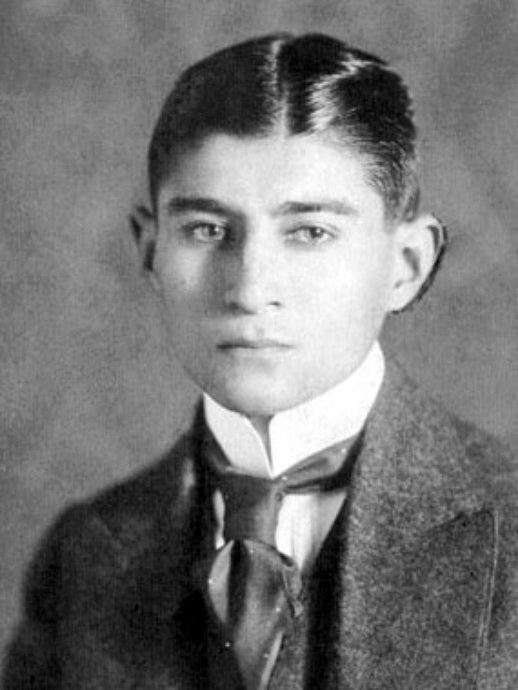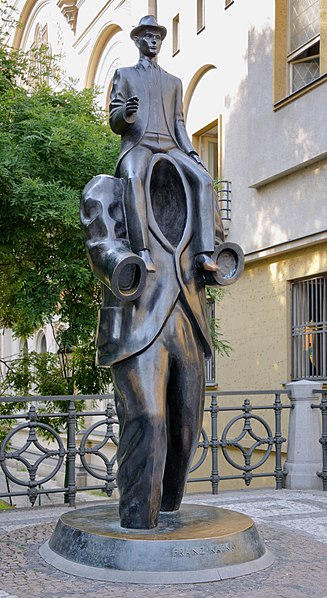 Franz Kafka was born on the third of July, 1883, in
Prague, Bohemia, which was part of the Austria-Hungary Empire back then, but is
now the Czech Republic. He was born into a middle class, German-speaking Jewish
family, and was the youngest of six children, Kafka being the oldest. His two
younger brothers died at the ages of fifteen and sixteen months old, and he had
three surviving, younger sisters. He was well educated throughout his youth and
into adulthood. He attended the Deutsche
Knabenschule German boys' elementary school from 1889-1893, and around the
time he went on to secondary school, he ended his Jewish education with his Bar
Mitzvah which was at the age of 13. His secondary school that he attended for
eight years was Altstädter Deutsches
Gymnasium, which was a challenging classic-oriented school. At the age of
18, he was admitted to the German
Charles-Ferdinand University of Prague, in which he studied chemistry, and
then law, in which he got a doctorate in on June 18, 1906. He had tough times
in his childhood, such as his brothers dying at young ages. Overall he had a
good childhood and youth, hiking with his friends, having many interests in
athletics, education, and writing, and a good family.
Franz Kafka was born on the third of July, 1883, in
Prague, Bohemia, which was part of the Austria-Hungary Empire back then, but is
now the Czech Republic. He was born into a middle class, German-speaking Jewish
family, and was the youngest of six children, Kafka being the oldest. His two
younger brothers died at the ages of fifteen and sixteen months old, and he had
three surviving, younger sisters. He was well educated throughout his youth and
into adulthood. He attended the Deutsche
Knabenschule German boys' elementary school from 1889-1893, and around the
time he went on to secondary school, he ended his Jewish education with his Bar
Mitzvah which was at the age of 13. His secondary school that he attended for
eight years was Altstädter Deutsches
Gymnasium, which was a challenging classic-oriented school. At the age of
18, he was admitted to the German
Charles-Ferdinand University of Prague, in which he studied chemistry, and
then law, in which he got a doctorate in on June 18, 1906. He had tough times
in his childhood, such as his brothers dying at young ages. Overall he had a
good childhood and youth, hiking with his friends, having many interests in
athletics, education, and writing, and a good family. Kafka's
adult life was full of promise and problems in different parts of his life.
After receiving his doctorate in Law, he took a few jobs such as being a part
of two insurance companies, the first, Assicurazioni
Generali, in 1907 and the second, Worker's
Accident Insurance Institute for the Kingdom of Bohemia, in 1908. In 1911,
he started to work at Prager Asbestwerke
Hermann and Co, a factory. He would always write regardless of his free
time, but he became serious about writing around 1908. He would mainly write
short stories, and many of them at that, but only publish a few in his adult
life. In the midst of the businesses he worked for, he wrote these stories and
novels at home. In 1912, he wrote the
stories Das Urteil ("The
Judgment"), Die Verwandlung
("The Metamorphosis"), and few others that became popular throughout
literature. He wrote many novels in his adult life as well, such as Der Heizer ("The Stoker") in,
or Der Process ("The Trial")
in 1914. He had a troubling relationship with his father, and was discriminated
against for being Jewish, which both of these personal hardships critiques
believed influenced his own writing. He also had a problem with his sex-life,
and how he had a lot of intimacies to compensate for thinking he was bad in sex
and to make him feel good for other things that were going on in his life. Kafka
had an overall pleasant adult life, with a few personal problems, but his
writing career progressed well in silence. The few pieces he published were
quite popular and are today in world literature.
Kafka's
adult life was full of promise and problems in different parts of his life.
After receiving his doctorate in Law, he took a few jobs such as being a part
of two insurance companies, the first, Assicurazioni
Generali, in 1907 and the second, Worker's
Accident Insurance Institute for the Kingdom of Bohemia, in 1908. In 1911,
he started to work at Prager Asbestwerke
Hermann and Co, a factory. He would always write regardless of his free
time, but he became serious about writing around 1908. He would mainly write
short stories, and many of them at that, but only publish a few in his adult
life. In the midst of the businesses he worked for, he wrote these stories and
novels at home. In 1912, he wrote the
stories Das Urteil ("The
Judgment"), Die Verwandlung
("The Metamorphosis"), and few others that became popular throughout
literature. He wrote many novels in his adult life as well, such as Der Heizer ("The Stoker") in,
or Der Process ("The Trial")
in 1914. He had a troubling relationship with his father, and was discriminated
against for being Jewish, which both of these personal hardships critiques
believed influenced his own writing. He also had a problem with his sex-life,
and how he had a lot of intimacies to compensate for thinking he was bad in sex
and to make him feel good for other things that were going on in his life. Kafka
had an overall pleasant adult life, with a few personal problems, but his
writing career progressed well in silence. The few pieces he published were
quite popular and are today in world literature.  Kafka
influenced writers of all kinds in the 20th century and today. His most influential
and published writing was The Metamorphosis
and it is studied in today's schools and universities for his style and
creative, complex writing. Kafka had a particularly big influence on the Jewish
population and Jewish literature in his hometown of Prague at the time, but he
also is in Jewish communities around the world even today. Being the world
known writer he was and is now, it was amazing to have such an influential
Jewish writer back in his time, and especially because of where he was from.
Not only was Kafka an influential figure in literature, but he was influenced
by other things and people as well. Kafka followed Judaism, but was interested
in Zionism, the protest religion that promoted the settlement of Jews in
Palestine. The founder, Theodor Herzl, was one of his biggest influences. Other
influences in the Jewish religion to Kafka were fellow friends such as Max Brod
and Martin Buber, and teachers such as Thieberger and Dora Dymant. All these
people were influential to Kafka because they taught him of Hebrew, Judaism in
its whole, Jewish traditions and culture, and political points such as Zionism.
These were important people to him because his interests and thus is writing
was all based on Jewish aspects and religion, in a metaphorical and creative
way. He was just as influential as he was influenced in many ways. Kafka wrote stories,
novels, translations, and other forms of writing, creative or analytical, but
his style of writing will always be easily recognized and will be forever.
Kafka
influenced writers of all kinds in the 20th century and today. His most influential
and published writing was The Metamorphosis
and it is studied in today's schools and universities for his style and
creative, complex writing. Kafka had a particularly big influence on the Jewish
population and Jewish literature in his hometown of Prague at the time, but he
also is in Jewish communities around the world even today. Being the world
known writer he was and is now, it was amazing to have such an influential
Jewish writer back in his time, and especially because of where he was from.
Not only was Kafka an influential figure in literature, but he was influenced
by other things and people as well. Kafka followed Judaism, but was interested
in Zionism, the protest religion that promoted the settlement of Jews in
Palestine. The founder, Theodor Herzl, was one of his biggest influences. Other
influences in the Jewish religion to Kafka were fellow friends such as Max Brod
and Martin Buber, and teachers such as Thieberger and Dora Dymant. All these
people were influential to Kafka because they taught him of Hebrew, Judaism in
its whole, Jewish traditions and culture, and political points such as Zionism.
These were important people to him because his interests and thus is writing
was all based on Jewish aspects and religion, in a metaphorical and creative
way. He was just as influential as he was influenced in many ways. Kafka wrote stories,
novels, translations, and other forms of writing, creative or analytical, but
his style of writing will always be easily recognized and will be forever. Franz
Kafka died the third of June,1924. Kafka's death was caused from the disease laryngeal
tuberculosis, a deathly cough. The main reason he died was because he starved
himself to death, but only because his cough hurt his throat so much that it was
too painful to swallow anything. He was sent away from his family to Berlin, so
he would not infect his children, the year before his death. When he returned
to Prague, it had only worsened, and he was sent to Hoffman's sanatorium for treatment on April 10, 1924, in which he
stayed there until his grueling death. His three sisters all died 18-20 years
later from/during the Holocaust, leaving the whole original Kafka family dead. Kafka
died as a hero in literature, and will forever be remembered, cherished, and
studied for his writing.
Franz
Kafka died the third of June,1924. Kafka's death was caused from the disease laryngeal
tuberculosis, a deathly cough. The main reason he died was because he starved
himself to death, but only because his cough hurt his throat so much that it was
too painful to swallow anything. He was sent away from his family to Berlin, so
he would not infect his children, the year before his death. When he returned
to Prague, it had only worsened, and he was sent to Hoffman's sanatorium for treatment on April 10, 1924, in which he
stayed there until his grueling death. His three sisters all died 18-20 years
later from/during the Holocaust, leaving the whole original Kafka family dead. Kafka
died as a hero in literature, and will forever be remembered, cherished, and
studied for his writing.
Works Cited
Biography.com. "Franz Kafka
Biography." Bio.com. A&E Networks Television, 2013. Web. 17
Mar. 2014.
CliffNotes. "The Metamorphosis
and Other Stories By Franz Kafka Critical Essays Kafka's Jewish
Influence." Kafka's Jewish Influence. Houghton Mifflin Harcourt,
2013. Web. 18 Mar. 2014.
Nervi, Mauro. "Kafka's Life
(1883-1924)." The Kafka Project. The Kafka Project, 08 Jan. 2011.
Web. 18 Mar. 2014.
Page, Larry, and Sergey Brin.
"Google." Google. Larry Page, 1998. Web. 18 Mar. 2014.
Wikipedia.org. "Franz
Kafka." Wikipedia.org. Wikimedia, 17 Mar. 2014. Web. 18 Mar. 2014.

.jpg)


No comments:
Post a Comment